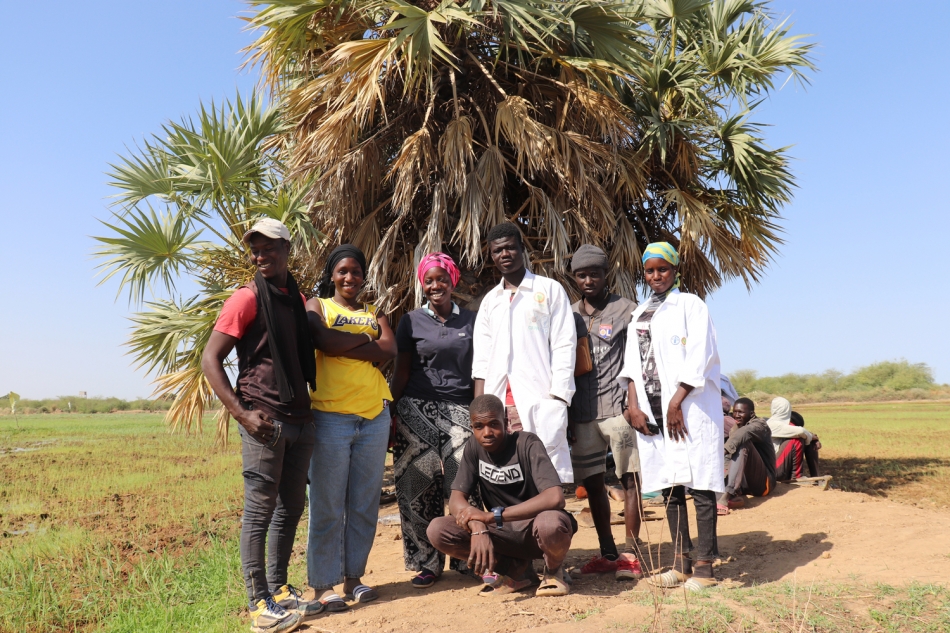
©FAO
Aly Oumar Mohamed Sy used to almost dread the idea of making a living from farming. But “now that I’ve learned how to take care of the soil and cultivate it, I consider farming as my life’s work,” says the 24-year-old from the Trarza region of Mauritania.
Like Sy, youths in Mauritania are uncovering the potential that their lands offer by acquiring skills and setting minds towards agriculture.
Some 40 per cent of Mauritania’s population falls between the ages of 15 and 35 years old and among them, almost the same proportion are neither employed, studying nor in training. Strengthening employment opportunities for youth is central to combating intergenerational poverty and improving the social inclusion of youth in Mauritania. It is also crucial in helping youth uncover the potential of their land.
Hence, providing an opportunity for the young people of the country to learn practical farming skills is crucial to improve their prospects in the labour market. In this regard, an initiative by the Food and Agriculture Organization of the United Nations (FAO) is now making a difference. The FAO project, Building resilience in the Sahel region through job creation for youth, is developing youth’s skills as well as tackling the lack of employment opportunities and poor labour conditions, which lead many into a vicious circle of poverty.

A key objective of the project, funded by the German Food and Agriculture Ministry, has been to provide practical and theoretical learning on the production of rice and vegetable crops. But the young people were also trained in setting up interest groups and cooperatives in order to be able to apply for land access programs and develop their own agribusinesses.
“We learn from our trainers and coaches new techniques but also traditional ones, the ones shared by our ancestors,” Sy says. Young people like him are undoubtedly best placed to rejuvenate the agriculture sector and build more sustainable structures by which food is produced, distributed and consumed.
That’s because youth more easily acquire the knowledge and skills needed to innovate. They are also more adept at making use of new technologies and spearheading digital transformation.
This has been a long-term initiative to strengthen young people’s agribusinesses and reinforce the country’s ability to provide green jobs. However, the project has also offered short-term employment activities. This helps to address urgent needs; supporting young people’s placement in the agricultural sector helps them avoid turning to negative coping mechanisms or migrating abroad out of necessity.
“This activity is very important for us. Through it we have seen that if we take care of these lands, the lands of our ancestors, we can stay here to cultivate it close to our families and environment instead of going abroad,” says 27-year-old Mapate Ousmane Ndiouck.
Some of these short-term employment initiatives were rolled out in the Trarza region, in the south of the country. This area hosts a predominantly young population, and agriculture and livestock play a key economic role, holding a high potential to offer job opportunities.
With its location at the crossroads between Mauritania and Senegal, Trarza is a commercially important area. Yet, youth residing there face many difficulties in accessing decent rural employment and “green jobs” that have a positive impact on the environment.
In partnership with the Mauritanian Ministry of Agriculture, 200 young women and men benefited from short-term employment opportunities through an agreement with the Rural Producers’ Training Centre (Centre de Formation des Producteurs Ruraux).
This aspect of the project strengthens rural youths’ skills through a two-month theoretical and practical training period. During this time, the young people also do paid work, supporting local communities with market gardening or rice growing.
These initiatives have already demonstrated many positive results such as improved knowledge about agriculture and green practices among youth, more success in attracting young people to the sector, improved job opportunities and increased intergenerational knowledge sharing, besides giving more young people the opportunity to work in their home districts.
“Most of us knew about agriculture as ‘consumers’ only but knowledge is powerful! After the enrolment and involvement in this activity, we see great economic opportunity and feel much more confident for our future,” stated Asta Mamadou Anne, a 25-year-old woman from Rosso.
With FAO’s support, many more of Mauritania’s youth are now also able to use their skills to become economically independent.
Source: the FAO News and Media office, Rome
– global bihari bureau





